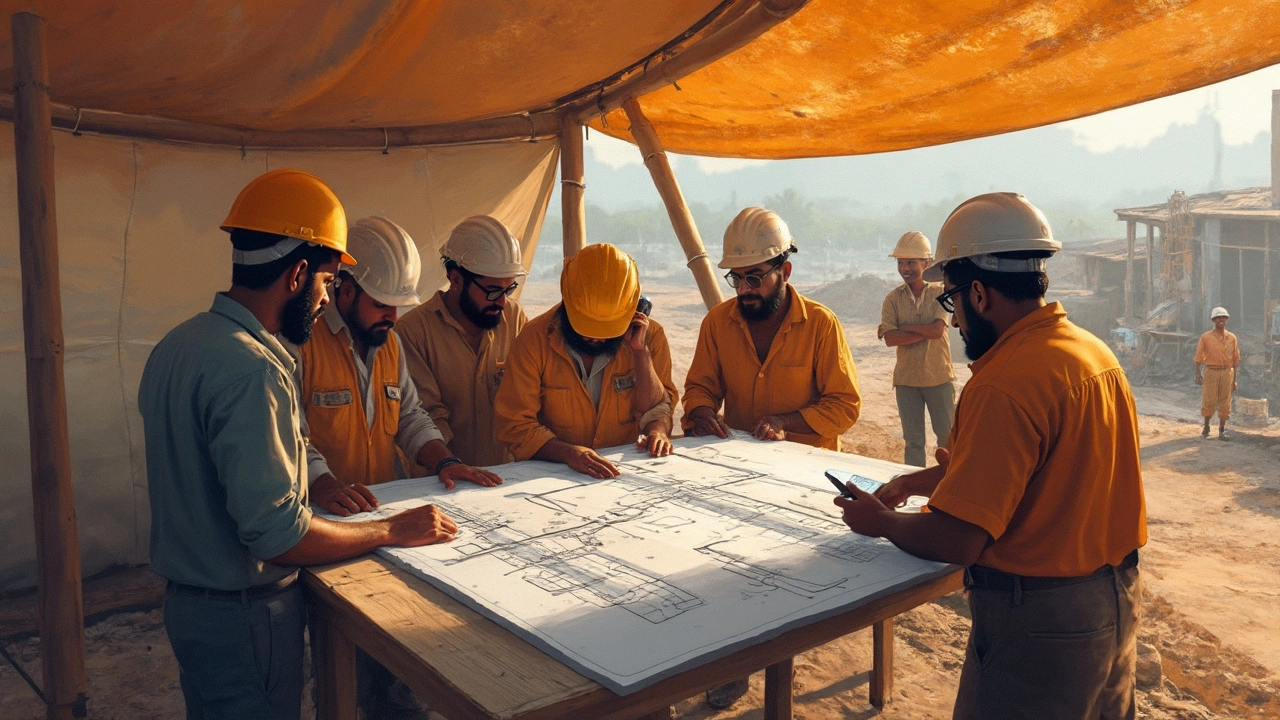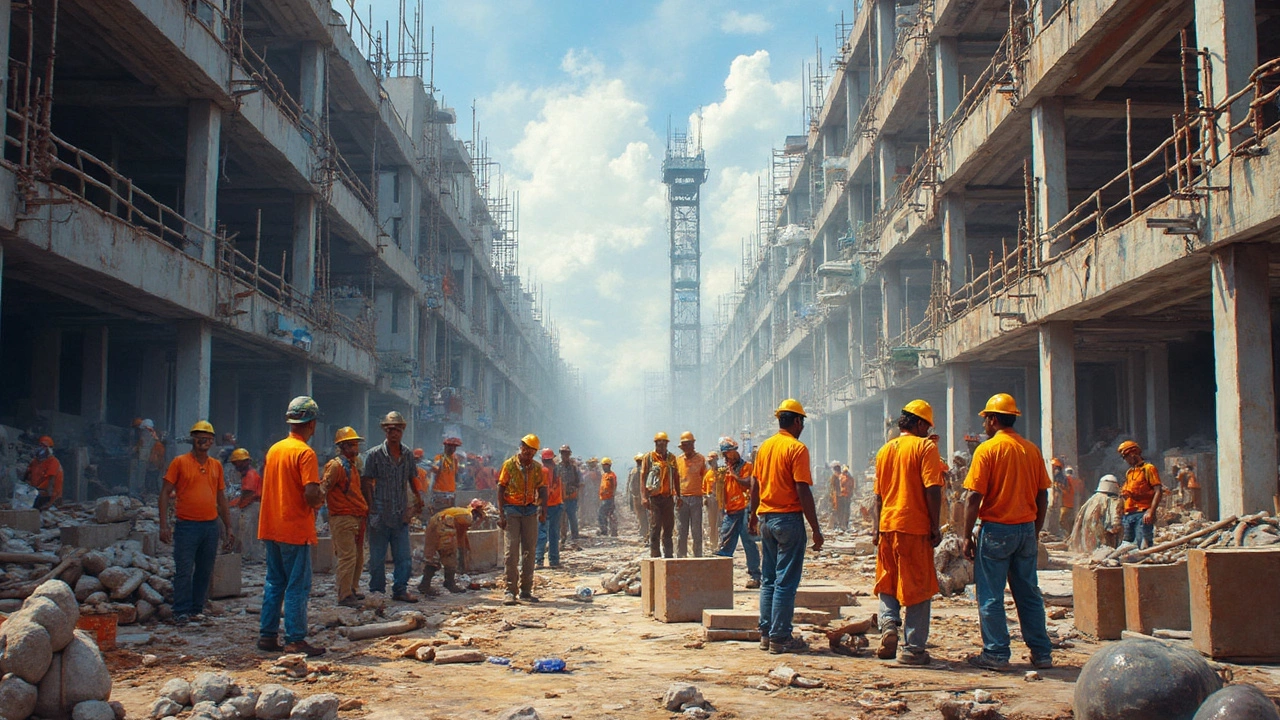When diving into a construction project, it’s easy to get lost in all the terms thrown around. One that pops up quite often is 'lower tier contractor.' But what are they exactly? In simple terms, lower tier contractors are the subcontractors hired by the main or principal contractors to handle specific parts of a project. Think of them as the specialists brought in to ensure every detail is executed to perfection.
Why not just let the main contractor handle everything? Well, construction projects are like complex puzzles, with each piece needing expertise to fit perfectly. Lower tier contractors bring that specialized knowledge to the table, whether it's plumbing, electrical work, or carpentry. Their focused roles allow the main contractor to manage the project efficiently without being bogged down by minute tasks.
Besides, hiring lower tier contractors can be a cost-effective move. They’re often more flexible and tailored to specific needs, ensuring that each element of the project is handled by someone who truly knows their craft. Plus, they help optimize the workflow, contributing to timely project completion.
- Defining Lower Tier Contractors
- Roles and Responsibilities
- Benefits of Using Lower Tier Contractors
- Choosing the Right Contractor
- Common Misconceptions
Defining Lower Tier Contractors
So, what exactly sets a lower tier contractor apart in the world of construction? Picture this: a major contractor lands a big project, like building a new office complex or a cozy neighborhood of homes. Now, instead of handling each intricate detail themselves, they bring in lower tier contractors to take charge of specific tasks or sections of the project. These are often referred to as subcontractors.
This setup is pretty common in the construction industry, as it helps keep things running smoothly. By involving these smaller, specialized firms, the main contractor can focus on overall management without getting buried in specific duties. Think of it as the main contractor being the director of a big blockbuster film, and the lower tier contractors as the tech crew operating the lights and sound. Everyone has a role, and when they work together, magic happens.
Key Characteristics
Lower tier contractors usually come into play in fields like plumbing, electrical work, or specialized installations. They're the go-to experts hired to handle jobs where precision is key. You might also find them in roles like delivering materials or specialized labor.
- Specialization: Unlike general contractors, they focus on specific job aspects. This ensures high-quality, specialized work for those particular tasks.
- Flexibility: They're often more adaptable to project demands and can quickly adjust to changes in scope.
- Cost-effectiveness: Employing these subcontractors can often reduce costs, as they bring niche expertise that can expedite specific project phases.
Typical Engagements
Lower tier contractors aren’t just about taking orders—they play a pivotal role. In some cases, they might oversee other smaller sub-teams or consult with the main contractor on the best materials and techniques to use, leveraging their specialized knowledge.
Sometimes, it’s the availability of lower tier contractors that can determine the speed and efficiency of a project. Need a stat to back this up? In a 2022 construction industry survey, 60% of contractors said having reliable lower tier partners improved project timelines significantly. This underscores just how integral these contractors are to a project’s success.
Roles and Responsibilities
When it comes to defining what a lower tier contractor does, it’s all about breaking down the construction puzzle into manageable pieces. These contractors specialize in specific areas, ensuring each task is tackled by someone with the right skills.
Specialized Expertise
Lower tier contractors bring focused expertise to the project. Whether it’s electrical work, plumbing, painting, or landscaping, these folks know their stuff. By handling these specialized areas, they free up the main contractors to manage the project from a big-picture perspective.
Project Efficiency
Using lower tier contractors can boost a construction project’s efficiency. They take charge of sourcing their materials, managing their teams, and meeting specific deadlines for their tasks. This means fewer headaches for the main contractor and smoother workflow overall.
Coordinating with Main Contractors
Communication is key in any project, and lower tier contractors excel at it. They coordinate closely with the main contractor to ensure their work aligns with the larger project goals. They often report progress and adapt their schedules to keep everything on track.
Meeting Legal and Safety Standards
Lower tier contractors are also responsible for understanding and following legal, safety, and building standards. It’s crucial for them to comply with regulations, not only to avoid fines or delays but to guarantee quality and safety on the job site.
Cost Management
Lastly, these contractors play a role in managing costs within their scope of work. By efficiently utilizing resources and labor, they can help keep the project within budget. This is another area where their specific expertise comes in handy, as they often know how to get the job done without unnecessary expenses.
In short, lower tier contractors are like the secret weapons of the construction industry. They bring knowledge, cut through the complexities, and ensure each piece of a project fits just right.

Benefits of Using Lower Tier Contractors
Bringing lower tier contractors on board can be a game-changer in construction projects. Why? Because they allow the main contractor to focus on the big picture while ensuring the finer details are expertly handled. Here’s why working with them can make all the difference:
Specialized Expertise
Lower tier contractors offer specific skills that might not be present in a main contractor's team. If you need specialized plumbing, electrical work, or carpentry, these folks are the ones to call. This specialization ensures each component of the project is completed to a high standard, enhancing overall quality.
Boosting Efficiency
Everybody loves meeting deadlines, right? Lower tier contractors often have the tools and experience to tackle their part of the project quickly and effectively, which helps keep the entire worksite running smoothly. By concentrating on their specific tasks, they free up the main crew to handle broader project management.
Cost-Effectiveness
By hiring subcontractors, main contractors can often save money. A specialist can complete their job more effectively and quickly than a generalist, which can lead to fewer costly mistakes and delays. As a result, projects may come in under budget.
"Working with skilled lower tier contractors is like assembling a dream team for your project. Each person knows their role, and together they create something amazing." – John H. Smith, CEO of BuildPro Solutions
Flexibility
Construction projects can sometimes change on a dime. Lower tier contractors offer the flexibility to adapt to shifting timelines or scopes without causing major disruptions. They tend to have more availability than larger firms and can adjust to new project phases as needed.
Improved Relationships
Finally, lower tier contractors often foster better local and industry relationships, which can open doors to more resources and opportunities. Their hands-on experience with other projects can offer new insights and improve the quality of work.
To sum up, hiring lower tier contractors isn't just about offloading tasks; it’s about leveraging expertise, increasing efficiency, and optimizing your construction efforts. Nothing beats having the right people for the right job when striving for project success.
Choosing the Right Contractor
Nailing the right lower tier contractor for your construction project can feel daunting, but it’s key to getting things done smoothly. Here's how to make the smart choice.
Understand Your Needs
First things first, figure out what you need. Is it plumbing, HVAC, electrical? Knowing the specific task helps narrow down the specialists you should approach.
Do Some Detective Work
Check their credentials. Are they licensed, insured, experienced? The right building construction team will have a track record of similar projects. Don’t shy away from asking for references or even checking online reviews to ensure you're getting someone dependable.
"Choosing the right contractor involves more than just looking at their price quote. It’s about assessing their experience, communication, and reliability," says John Doe, CEO of BuildSmart Industries.
Get Multiple Bids
Never settle for the first bid you receive. Get at least three different quotes to compare costs and scope of work. This helps you gauge the market rate and spot any red flags if a bid is suspiciously low.
Communicate Clearly
Make sure to outline your needs and expectations from the get-go. A good contractor will value open communication and be upfront about what they can and cannot do. Clarity avoids misunderstandings later in the project.
Check Their Safety Record
Safety first, right? Ensure that the contractor follows all safety protocols and complies with regulations. A solid safety record is as important as their technical skills.
| Attributes | Importance Level |
|---|---|
| Experience | High |
| Communication | High |
| Cost | Medium |
| Safety | High |
Choosing the right contractor might take some work, but it’s crucial for the success of your construction project. With a little effort, you’ll find someone who not only meets but exceeds your expectations, ensuring your project is on time and within budget.

Common Misconceptions
When it comes to lower tier contractors, there's no shortage of confusion. Many folks think they're just a middleman taking a cut from the main contractor's pie, but that's far from the truth. In reality, they are specialized experts who ensure every detail of a construction project meets the required standards.
Misconception: Lower Tier Contractors Lack Expertise
A common myth is that these contractors lack the skills or expertise, which couldn't be more wrong. They're often specialists in their own right, with years of experience under their belts. A project manager once said, "
Lower tier contractors are the backbone of any successful project, bringing precision and quality to specialized tasks."Not to mention, collaborating with a skilled team often speeds up the process, saving time and costs.
Misconception: Hiring Them is More Expensive
The notion that hiring these subcontractors will blow up your budget doesn't hold water. In fact, lower tier contractors can be a cost-effective choice. They operate more efficiently due to their focused tasks, often negotiating better for materials given their niche market connections.
Misconception: Communication is Challenged
There’s a belief that more contractors mean more communication breakdowns. Yet, when main contractors choose reliable lower tier contractors, it adds a layer of management that ensures clearer communication. It’s all about selecting the right partner. Regular meetings and updates are typically set to keep everyone informed and the project on track.
| Benefit | Explanation |
|---|---|
| Specialization | Access to niche expertise. |
| Cost-Effectiveness | Optimizes labor and material costs. |
| Efficiency | Speeds up project completions. |
In the end, dismantling these misconceptions could lead to smarter project strategies. By recognizing the actual value that lower tier contractors bring, construction industries can maximize their potential while achieving quality and efficiency.

Written by Fletcher Abernathy
View all posts by: Fletcher Abernathy